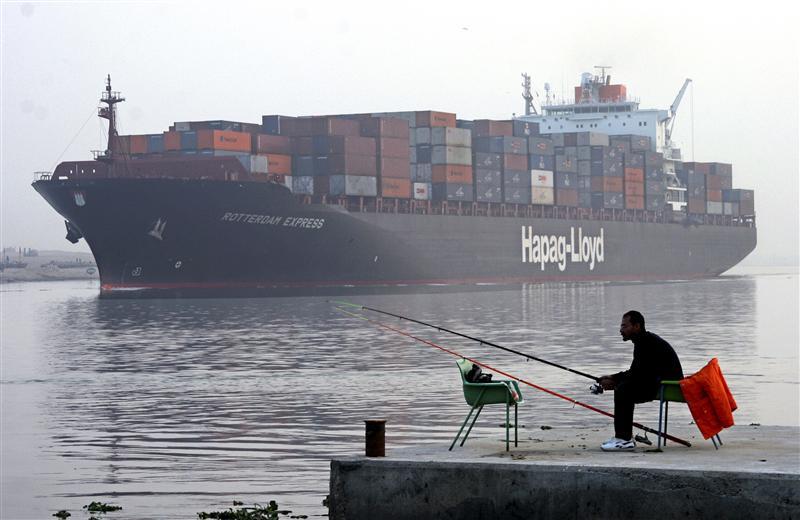Latest NEWS
- Aswat Masriya, the last word
- Roundup of Egypt's press headlines on March 15, 2017
- Roundup of Egypt's press headlines on March 14, 2017
- Former Egyptian President Hosni Mubarak to be released: lawyer
- Roundup of Egypt's press headlines on March 13, 2017
- Egypt's capital set to grow by half a million in 2017
- Egypt's wheat reserves to double with start of harvest -supply min
- Roundup of Egypt's press headlines on March 12, 2017
Egypt Suez Canal master plan to be finalised in nine months

Cargo ship in Suez Canal- Aladdin Abdulnabi/Reuters.
CAIRO, Jan 6 (Reuters) - Egypt has invited 14 consortia to bid for a chance to say how they would develop the Suez Canal area, officials said on Monday, aiming to attract more ships and revenue to shore up the country's finances.
The Suez Canal is the fastest shipping route between Europe and Asia and brings in around $5 billion a year, a source of hard currency whose importance has risen since a popular uprising in 2011 scared off tourists and foreign investors.
"We must move dynamically ... Investors must find service here at an international level because if they do not find it here they will go some place else," Mohab Memish, head of the Suez Canal Authority, said at a press conference in Ismailiya.
Egypt wants to turn 76,000 square kilometres (29,000 square miles) around the canal into an international industrial and logistics hub, reviving economic development after more than three years of economic and political turmoil.
The approved consortia will be able to buy bidding documents from Jan. 8-23. A winning consortium will be selected in the next three months and will have a further 6 months to come up with a master plan, Memish said.
Egypt's Interim Prime Minister Hazem el-Beblawi said the master plan will be presented to the cabinet within nine months.
In November Egypt will host an international conference for investors and in early 2015 infrastructure work on the project will begin, Memish said.
Gulf allies Saudi Arabia, the United Arab Emirates and Kuwait came to Egypt's aid by pledging a combined $12 billion after the army, prompted by mass protests, overthrew the country's first elected leader Mohamed Mursi in July.
But Egypt is in dire need of longer-term development to generate revenues and tackle youth unemployment, estimated at over 20 percent.
The Suez Canal project was a main feature in the campaigns of the most prominent candidates in the 2012 election. It was adopted by the Mursi administration but opposition groups accused him of attempting to seize and sell public land to foreign countries.
Memish said the project would be put to the public for national discussion before it is adopted. (Reporting by Asma Alsharif and Omar Fahmy; Editing by Ruth Pitchford)










